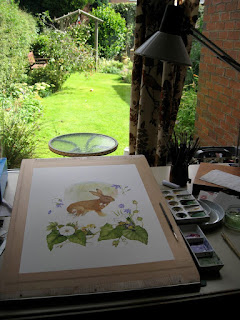How is it that you became an illustrator?
I spent most of my childhood drawing or daydreaming so I suppose it was inevitable that I was drawn towards art and design. I consider myself very fortunate to have been able to pursue a career that I love. Many of my ancestors had no such advantages despite showing artistic talent, circumstances did not allow them to follow in the same footsteps. I feel blessed to have been born into a world where education was open and free. I was not obliged to work in a cotton mill or factory nor I did not have to fight in any war in the way many of my predecessors did.
Did you go to art school?
I went to Manchester Metropolitan University, Faculty of Art and Design in the UK. I studied textile design but our studies had a strong emphasis on drawing, mainly life or plant drawing.
Was there anyone that inspired you to become an illustrator?
When I was a student I discovered the work and teachings of Walter Crane and have been influenced by his decorative approach to art and design.
My art college had strong connections with the Pre-Raphaelites, there were textiles and furniture at the nearby Whitworth Art Gallery and their paintings hung in the Manchester Art Gallery. I loved the Arts and Crafts Movement and the way they were inspired by nature.
What inspires you now?
Nature has always been my main influence and inspiration. I love detail, pattern and the repetition of forms in the natural world.
Is there anything you would like to share about how you work?
I tend to work mainly in water colour. I love working on stretched Bockingford paper, preferring cold pressed paper with a slight texture. My painting technique consists of building up colour by tiny brush strokes, sometimes on a wash background. It is very laborious and time consuming and is done entirely by hand in the traditional manner. I do sometimes scan my work into Photoshop and change the format to fit different shapes but I always start with a painting or drawing on paper.
What types of markets do you illustrate for?
My artwork has appeared on books, stationery, calendars, ceramics, textiles, tableware, flags, needle work kits, jigsaws and many more.
Are there any links to your work you would like to share?
My website, http://www.valeriegreeley.com/
My blog, http://acornmoon.blogspot.co.uk/
My Etsy Shop, http://www.etsy.com/shop/acornmoon?ref=em
My Facebook Page, https://www.facebook.com/valerie.greeley
Do you do other things regarding art like teaching or school visits?
I have given workshops and have done many school visits although I tend to take more workshops than I give, in fact I am something of a workshopoholic!
Are there other creative interests that you pursue?
I am very interested in the book arts and bookbinding. I also enjoy quilt making and gardening.
Do you currently have product with you images on the market?
Here are links for several items.
original artwork for sale- http://www.booksillustrated.com/artists-and-sculptors/valerie-greeley/8252
signed limited edition prints- https://www.etsy.com/listing/107312751/two-owls-as-sentinels-stood-by-valerie
birthday calendar http://www.arthritisresearchuk.org/shop/products/calendars-and-diaries/slim-calendars/birthday-calendar.aspx
What do you love best about what you do?
No two days are the same and I am never bored.



































